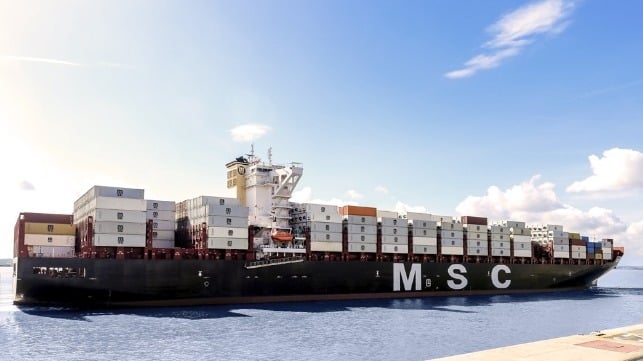MSC Defends its Response to FMC on Shipper’s Complaint

MSC met the deadline set by the FMC’s administrative judge hearing the complaint of Shipping Act violations against the carrier strongly refuting the accusations that the company has not supplied information and could be subjected to a default judgment. The world’s largest carrier continues to vigorously defend its actions calling the problems the shipper experienced errors and poor communication involving no wrongdoing by MSC.
Two weeks ago, Judge Erin Wirth hearing the complaint by a Pennsylvania-based furniture company against MSC over a failure to transport its containers threatened MSC with a default judgment. She detailed in her order a failure by MSC to supply discovery materials instead stalling and citing issues of Swiss law. The judge gave MSC until September 22 to reply and supply the materials before she would rule.
“A default judgment is a drastic sanction that undercuts the desired goal of deciding cases on their merits,” MSC’s lawyers wrote in a 32-page response to the judge that lays out in detail the company’s position supported by another 30-pages of expert opinions. The response calls the actions “unwarranted and inappropriate,” based on the current circumstances.
The response is the latest step in a complaint initially filed in July 2021 accusing MSC and co-defendant COSCO Shipping Lines of collusion to manipulate the freight market. MCS Industries contended that the carriers had denied it transportation of its containers under long-term freight contracts forcing the company into the spot market. Like other shippers, MCS has argued that the actions of the carriers inflated the spot market and costs for shippers who were forced to pay much higher prices when the carriers failed to honor their contracts.
MCS later settled with COSCO and refiled the complaint against MSC dropping the charges of collusion. The continuing elements of the complaint focus on the denial of contracted service. MCS’s lawyers and the judge have said that MSC has repeatedly failed to provide detailed information during the discovery relating to issues such as communications from the carrier about canceled sailings, capacity, and space availability on ships on specific sailings.
“MSC has provided full discovery on what the complainant itself has termed the ‘heart’ of the conduct it is challenging in this case,” MSC says in its response submitted to the judge yesterday. The company argues that the remaining discovery has been “mooted” by the revision of the complaint or concerns “matters tangential” to the claims. They also respond to some of the requests saying that MSC’s objection is that they are “overbroad, vague and duplicative.”
They also continue to cite issues of Swiss law saying the company has not acted in bad faith or willful misconduct. They attest to having supplied discovery materials before triggering Swiss blocking statues. Furthermore, they argue that MSC “cannot comply with the motion to comply without violating Swiss law and exposing itself to criminal liability under Swiss law.” They however say that the judgment can not be issued because alternative channels to avoid an irreconcilable conflict with Swiss law are available and have not been fully exhausted.

that matters most
Get the latest maritime news delivered to your inbox daily.
MSC is also highlighting that the judge’s current order only concerns the information for the discovery and is not a ruling on the merits of the case which the company continues to call “baseless.” In a written statement addressing the case, the carrier says, “MSC has investigated the matter and has concluded that MCS Industries' difficulties with its cargo bookings arose from errors and communication issues between MCS Industries and third-party intermediaries, and not from any wrongdoing by MSC. Accordingly, MSC will continue to defend this case vigorously.”
The complaint is one of several similar cases pending before the FMC over allegations that shippers have not honored freight contracts supplying only a small fraction of the container transportation in their contracts. The FMC encourages shippers and carriers to settle their disputes but at the same time has prepared for the potential of more complaints based on the problems in the industry during the past two years and recent amendments to the Ocean Shipping Act.
